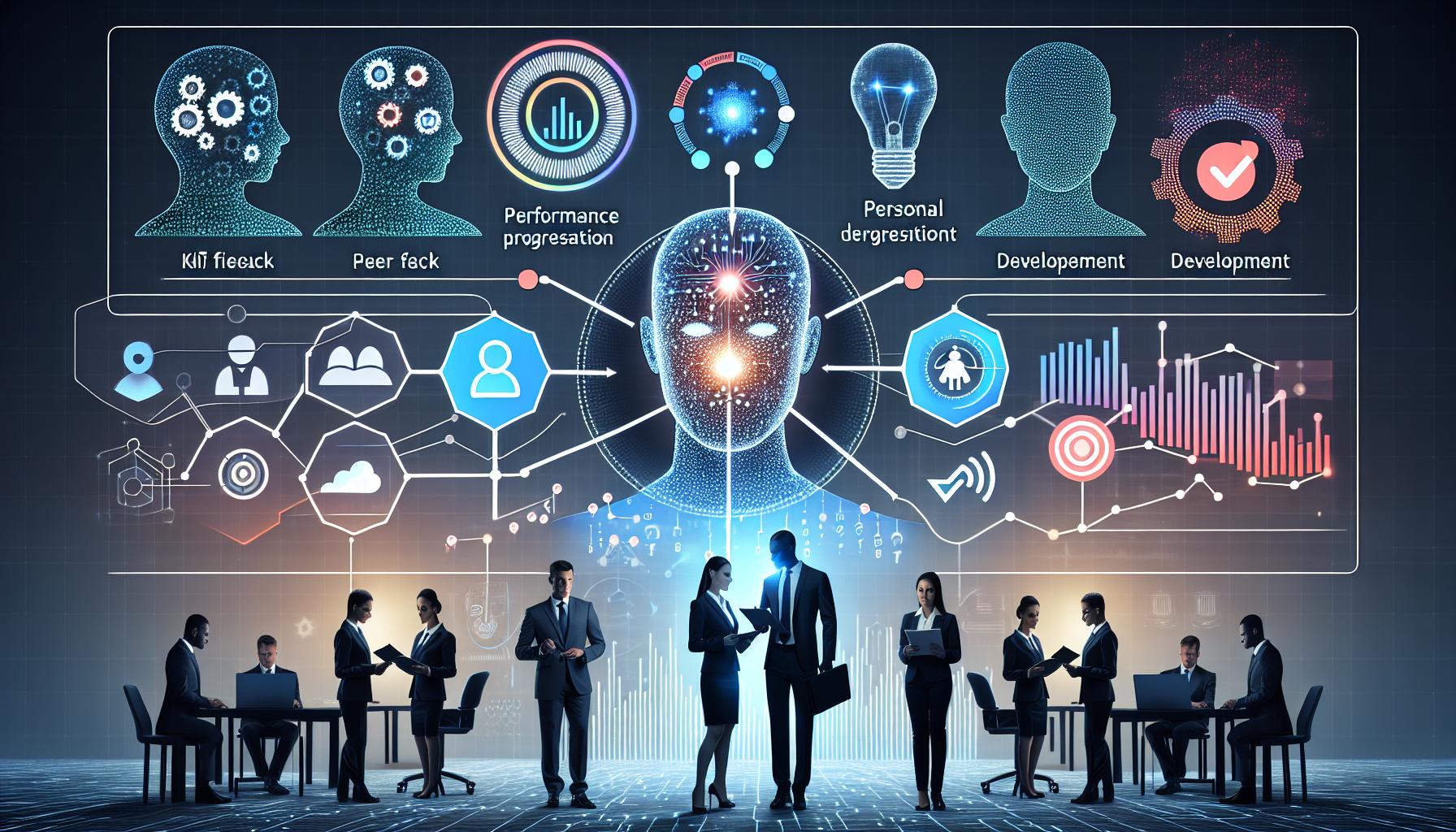Holistic Employee Performance Management: AI Integrating Feedback, KPIs, and Development Plans

Introduction
In the dynamic landscape of modern business, managing employee performance is a complex task that demands careful integration of various data aspects. This includes peer feedback, Key Performance Indicators (KPIs), and tailored development plans. With the advent of Artificial Intelligence (AI), organizations have a powerful tool to streamline this integration and achieve a holistic understanding of employee performance. This article explores how AI plays a pivotal role in centralizing these data points, identifying skill gaps, predicting career progression, and customizing training programs to fulfill individual and organizational aspirations.
The Need for Integration
Traditionally, employee performance management has been fragmented, relying heavily on periodic reviews and inconsistent feedback mechanisms. This approach often fails to capture a comprehensive picture of an employee's skill set, accomplishments, and areas for improvement. However, with AI, these disparate elements can be unified into a cohesive system that continuously monitors and evaluates performance, ensuring timely and accurate insights.
The Role of AI in Feedback Integration
Feedback from peers and managers is crucial for continuous development. AI-powered systems can aggregate this feedback from various sources, including emails, project management tools, and performance review platforms. By employing Natural Language Processing (NLP) and sentiment analysis, AI can decode the context and sentiment behind feedback, categorizing it effectively. This not only saves time but also provides a more accurate reflection of employee performance and areas needing attention.
Enhancing KPIs with AI
KPIs are quantitative measures that track an employee's efficiency, productivity, and overall contribution to organizational goals. AI can enhance the accuracy and relevance of KPIs by continuously analyzing large volumes of data in real-time. This allows for the identification of patterns and trends that may not be evident through manual analysis. Furthermore, AI can set dynamic KPIs that evolve based on changing business needs and personal career goals, offering a more flexible and responsive performance management system.
Personal Development Plans: Making Them Truly Personal
Standard development plans often lack the personalization required to address individual employee aspirations and skill gaps. AI excels in this area by analyzing an employee's historical data, feedback, and KPI performance to recommend highly tailored development plans. By bridging the gap between organizational objectives and personal growth, these plans become more effective and motivating.
Identifying Skill Gaps
A significant advantage of AI in performance management is its ability to pinpoint skill gaps with high precision. By continuously analyzing performance data, AI systems can identify areas where employees may be lacking specific skills or knowledge. This prompts timely interventions such as tailored training sessions or mentorship programs, ensuring that employees are well-equipped to meet their job demands and progress in their careers.
Career Progression Predictions
Using historical performance data and sophisticated algorithms, AI can predict potential career trajectories for employees. These predictions consider various factors, such as current skill sets, performance trends, and industry standards. By understanding where employees are likely to excel, organizations can proactively prepare them for future roles, fostering a more robust internal talent pipeline and reducing turnover rates.
Tailored Training Programs
Training is an integral part of employee development, and generic training programs often miss the mark. AI can recommend training modules that are perfectly aligned with an individual's needs and career goals. By analyzing performance data and feedback, AI identifies the most relevant training opportunities, whether they involve technical skills, leadership abilities, or creative problem-solving. This targeted approach ensures that learning is both effective and engaging.
Case Studies: AI in Action
IBM: IBM uses AI-driven platforms to manage employee performance. By integrating Watson AI, they analyze various data points, including peer reviews and project outcomes, to generate actionable insights. This has resulted in more accurate performance evaluations and personalized career development plans.
Google: Google employs AI to ensure that employee feedback is timely and constructive. Their system uses machine learning algorithms to process feedback data, highlighting key areas of improvement and recognizing exceptional performance. This has significantly improved employee satisfaction and retention rates.
Deloitte: Deloitte has integrated AI into their performance review process, allowing for continuous assessment and feedback. Their AI system not only tracks performance metrics but also aligns them with career development opportunities, providing employees with clear progression paths.
Conclusion
The integration of AI in employee performance management is revolutionizing the way organizations approach talent management. By unifying feedback, KPIs, and development plans, AI provides a comprehensive and dynamic view of employee performance. It identifies skill gaps, predicts career progressions, and recommends tailored training programs that enhance both employee satisfaction and organizational productivity. As evidenced by companies like IBM, Google, and Deloitte, the adoption of AI-driven performance management systems is not just a trend but a strategic necessity in today's competitive business environment.




